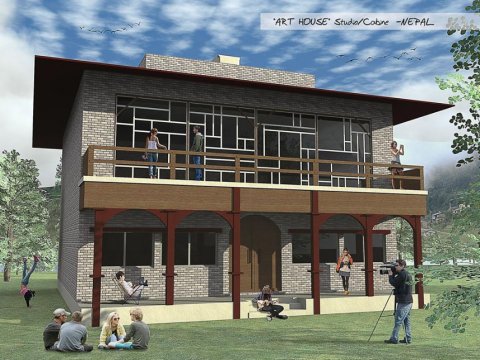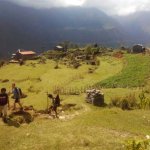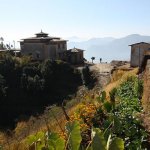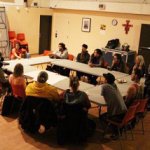Trek the Himalayas in Nepal and Help Develop a New Cultural Center
Support the development of a new cultural center in Nepal while finding respite in the serene Himalayan Mountains.
For the past few months, the Toronto Group has been organizing the creation of a cultural center in Nepal that will eventually host retreats and workshops on spirituality, leadership and the arts. On November 27th members of the group presented to a community group for social justice, about the idea of the center and its workshops. In the spring of 2015, members from the Toronto Group, (most of whom are artists) will be traveling to Nepal to deliver workshops, and to conduct a needs assessment with the host community at the future site of the center. To raise funds for the building of the center, we are hosting our first fundraising trek in May 2015. This trip will be a mix of light hiking through remote villages, with workshops and cultural exchanges, as well as some opportunities for meditation and yoga in the Himalayas.
If anyone is interested in participating in this, please contact mark@coeworld.org
The Center for Sharing and Learning (Nepal)
About
The purpose of the center is to offer a platform for creative expression and enquiry, for both international artists and local youth. This platform will be rooted in the values of collaboration, compassion and honoring culture.
By using the center as a model of an eco-friendly and sustainable institution, we hope to contribute to the ethical development of the region, while educating all people about alternative models for living and participating in society.
We are using the arts as a medium for cultural exchange and social development because we believe that arts can convey meaning and transcend cultural barriers more effectively than other means. Being creative doesn’t require any education or even literacy, and so it is accessible to all people.
Location
The Center is located in the village of Shalmi, in the region of Helambu in Nepal. Currently there is no road access to the site, but it can be reached through a 1.5 hour hike from the neighbouring village of Sermathang. Sermathang has a road that is in accessible during monsoon season.
There is a local bus that a travels daily from Kathmandu to Sermathang during the dry season (depending on road conditions). The trip costs about $10 and takes roughly 8 hours. That said, it is generally recommended that visitors travel from Kathmandu to Thimbu (a 5.5 hours trip on proper roads), then walk to Shalmi, via Sermatang (a 6 hour journey), spending one night at a guest house in Thimbu.
The village of Shalmi, is home to about 100 people, living in 30 homes. The people belong to the Hyolmo-Sherpa community. There is one temple/monastery that plays host to annual festivals and is maintained by one local community member. There are no guesthouses, shops or restaurants, but food and shelter is provided by host families. Such accommodation is easily found in neighboring Sermathang.
The site was chosen because the local partner David Tashi Lama has donated a plot of land in the region, and it is remote without requiring a daunting or dangerous journey. The land itself is ideal for the cultivation of Apple trees, tea and coffee bushes, as well as certain medicinal herbs. The plot of land rests on the outskirts of Shalmi, providing a degree of privacy for the future retreat center.
Development Plans
The initial phases of the project will begin in the spring of 2015.
Phase 1: Semi-permanent Bamboo structures, basic landscaping
The center will begin by clearing the land and building a couple of small studio spaces in Shalmi, while documenting the process through a series of online videos and a blog. There is already bamboo growing locally on the land, which will be harvested for our first structures.
Phase 2: Artist in Residency Program

The artist in residency program is geared towards individuals looking for long term stays, up to the maximum of 5 months out a the calendar year (as per the limits of a tourist visa). Artists will be offered food and accommodation as well as studio space for weekly or monthly rate.
The artists will also provide out–of-school programs using the studio space to host art classes for local youth. The idea is to simply give youth a platform to explore art and be creative.
A website needs to be produced to promote this service, in tandem with the education programs for the local community.
Phase 3: Sustainability Project and Expanded Gardens
Once the artist in residency program is operational, the next step will be to make the center eco- friendly, while building the capacity of the center to be sustainable and self-sufficient.
Apple orchards will be planted as well as wild flower gardens and bee boxes. One major goal will be to secure an abundant water source, and to build proper sanitation facilities without putting any stress on the host community.
Phase 4: Primary Activity Building
The Primary Building will be an open concept studio room, as seen in the picture above. The proposed design would include one hall, two bedrooms and a dining area. This space will be used to host larger community events and accommodate group retreats up to 15 people (i.e meditation and yoga groups).
Phase 5: Additional Private Studio Spaces
If the demand for the center increase beyond its initial capacity, additional studio spaces and other facilities may be developed. That said, limits must be placed on the number of people the center can accommodate to remain sustainable.
The Workshops
In addition to offering basic classes in arts, crafts and environmentally-friendly design, the center will be used to offer programs directed toward civic education and empowerment. Through the use of facilitated and guided workshops students will be introduced to philosophy and social thought.
The goal for these workshops is to promote and encourage the development of rational self- awareness through interactive exercises, that follow Children of Earth’s system of Reflect, Connect, Act. The driving force behind this idea is to not just inform, but to explore the philosophical idea surrounding self-awareness, personal identity, ethics, why society exists, how we benefit from society, and how society can benefit from our service. We advocate the importance of these concepts in the foundation of a good society. With this base, we seek to encourage young people to understand the relevance of philosophy not as some highfalutin thing but as an exercise, accessible to all and capable of developing thoughtful young citizens.

Our workshops themselves are to be far removed from a school classroom format. We do not seek preach the philosophies of a set curriculum, train our students such that they can fulfill certain criteria, or test them on a structured educational basis. Rather, we want to encourage our students to introspect and be creative in their learning of these ideals, and let that process in itself provide the intellectual basis for which they can begin to understand for themselves the laws and dynamics of society that are so deeply rooted in great philosophic teachings before us.









